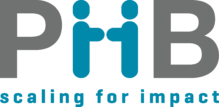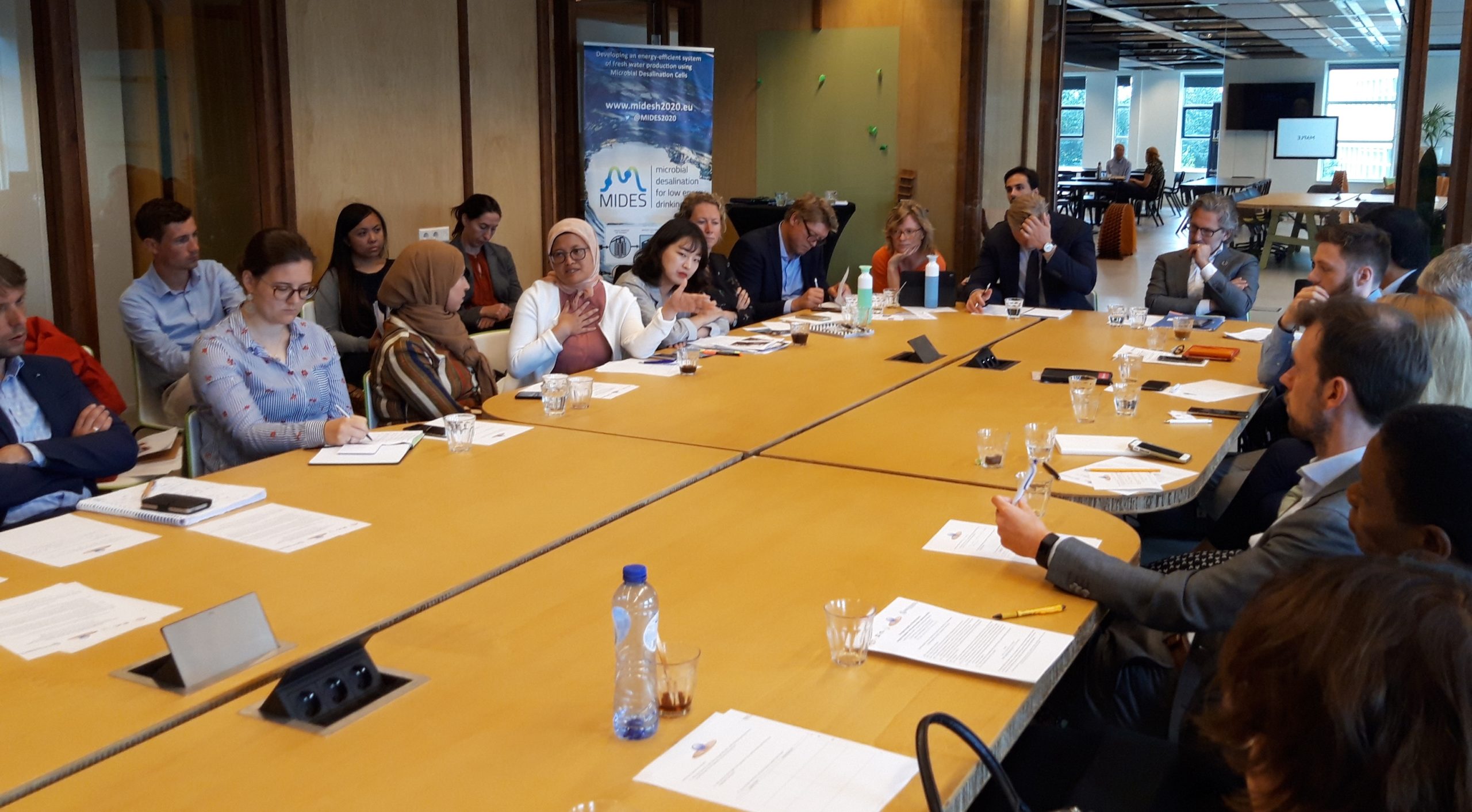
PHB Co-hosts Roundtable on Practical Adaptation to Climate Change
“Innovative Adaptation in Africa and Asia: Water, Agriculture and SDGs” was the theme of the meeting, which was held at the Humanity Hub, a rally point and working/meeting place of “doer” organizations which are “innovators in peace, justice, and humanitarian action.”
Some 30 international organizations and embassies gathered in The Hague, the Netherlands, on 5 July to brainstorm on how water resource management, agriculture and financial systems in developing countries can better respond to a changing climate. This 9th meeting of The Hague Roundtable on Climate & Security was co-hosted by PHB Development. PHB – which is expanding beyond Digital Financial Services to a range of Mobile Information Services – was met by an enthusiastic group of participants from organizations working to improve the lives of people in climate-affected regions.
“Innovative Adaptation in Africa and Asia: Water, Agriculture and SDGs” was the theme of the meeting, which was held at the Humanity Hub, a rally point and working/meeting place of “doer” organizations which are “innovators in peace, justice, and humanitarian action.”
In presentations, Vice-Rector Prof. Charlotte de Fraiture of IHE Delft Institute for Water Education highlighted initiatives on water resource management and capacity building in developing countries. Practical action based on such initiatives can help mitigate prospects of climate apartheid, in which the wealthy can isolate themselves from the impacts of climate change, while the majority are negatively affected.
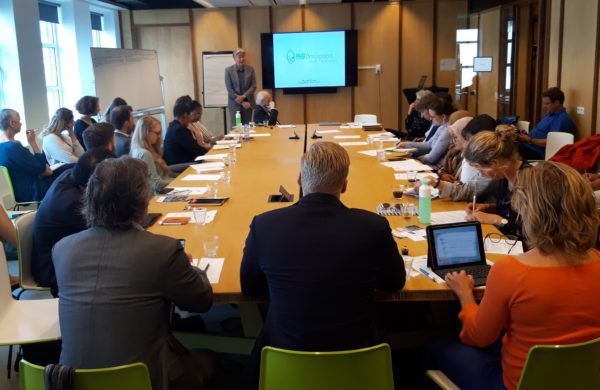
PHB partner Ronald Everts (standing in photo) presented projects in Mali and in Indonesia, where unexpected partnerships process satellite- and drone-gathered data, so it becomes accessible to smallholder herders and farmers via mobile phones. They can then locate and manage natural resources that are essential to their productivity and livelihoods.
In a highly interactive session, participants examined the presented initiatives and used their own expertise to develop recommendations. “Who owns and processes the data?” was a recurring consideration, with implications for empowerment, privacy and even land rights of low-income people. Links to the UN SDG’s was established throughout the brainstorming.
Ronald Everts: “I was impressed by the dynamic interaction with the “doers” in the room. The objective to link parties in this field was clearly a success. I was equally pleased that PHB’s chosen approach in the projects I presented struck a chord, and a good number of participants reached out for further information. I am looking forward to the follow-up.”
Contact Ronald Everts for more information and follow-up possibilities.
The Hague Roundtable on Climate & Security is an independent forum to promote international cooperation in adapting to climate risks to human well-being, sustainable development, and peace. The next Roundtable will be held on 12 September, hosted by the Embassy of Germany in The Hague: “Extreme Weather Disasters – Resilience, Forecasting and Cooperation.” Visit the Roundtable contact page to get in touch for more information.
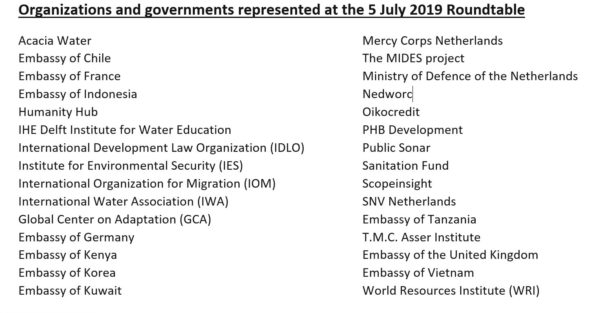
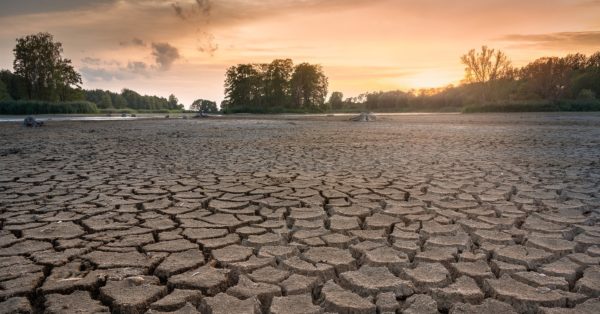
PHB in digital adaptation to climate change
Adaptation of agriculture to changing climate patterns and potential increases in refugees will be among topics discussed at the 8th meeting of The Hague Roundtable on Climate & Security on 4 December.
Adaptation of agriculture to changing climate patterns and potential increases in refugees will be among topics discussed at the 8th meeting of The Hague Roundtable on Climate & Security on 4 December. More than 50 participants from 30 embassies and 12 organizations are expected meet to share strategies on climate adaptation at the event that will be hosted by the Embassy of Vietnam in The Hague.
Digital Financial Services (DFS) are offering an increased range of capabilities in assisting farmers with weather and agricultural applications, as well as enabling a growing number of refugees to become more financially independent. PHB will be a part of the conversation at the Roundtable to share these kinds of trends that can help people in areas that are experiencing more severe climate change impacts.
PHB has given technical assistance to the digitization of payments for projects in agriculture value chains in Uganda: tea, coffee, maize, dairy and soybeans. The result has been available digital services that can help streamline production processes and capabilities in changing conditions. There has also been progress with initiatives such as the Sustainable Technology Adaptation for Mali’s Pastoralists (STAMP) program in Mali to provide farmers and pastoralists with target information on resources – with an aim of meeting needs more easily and reducing the potential conflict over these sources of livelihoods.
Providing financial services to refugees is receiving increased attention at forums such as the European Microfinance Week (EMW) that was held last month in Luxembourg by the European Microfinance Platform. From the delegation of three PHB consultants attended the conference, Alexa Sanchez moderated a panel session on Advancing access to financial services for refugees: Digital solutions to expand access and lower costs. And the EMW 2019 conference will be centered around Microfinance in Adaptation to Climate Change.
Keep a watch on the PHB website for a podcast interview about the refugee panel, and for more soon on PHB’s participation at the EMW 2018. There will also be a report published on the upcoming Roundtable at the Embassy of Vietnam.
About the Roundtable: The Hague Roundtable on Climate & Security is an independent forum to promote international cooperation in adapting to climate risks to human well-being, sustainable development, peace and political stability. Created in 2015, participants from representatives of governments and organizations meet for informal conversations to share information and strategies in adaptation regarding water resources, natural disasters, floods, droughts, sea level rise, migration, potential conflict and stability of fragile states. PHB communication consultant Matt Luna is the creator and organizer of the Roundtable initiative.
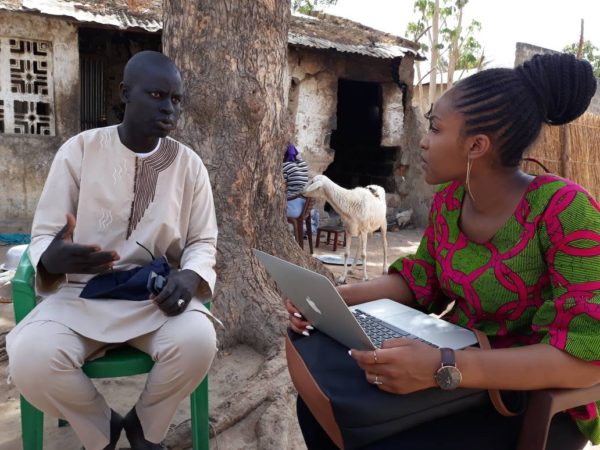
A path-in-progress toward financial inclusion
Ruth Thiemele-Kadjo shares highlight of her professional path so far, and what motivates her work on financial inclusion initiatives in this interview ofa Mobile Money agent in rural Senegal.
Interview with PHB Consultant Ruth Thiemele-Kadjo
Ruth Thiemele-Kadjo is a consultant with PHB Development with a current focus on DFS strategy, agent research and regulation in West African countries. Born and raised in Dakar, Senegal, Ruth built her initial financial services experience through hands-on work including with the African Microfinance Transparency Association as she completed her Bachelors in Finance at Bordeaux Ecole de Management in Dakar. She was happy to share highlights of her professional path so far, and what motivates her work on financial inclusion initiatives.
What is your core motivation?
In Senegal, you can see a big difference in the rich and poor. There has always been a big gap, and I asked myself how can I contribute to economic development in Africa and the quality of life for the people?
I discovered PHB in Fall 2016, and I joined as a part-time consultant. With my previous experience in microfinance and development, it has turned out to be a good match to learn about digital tools in a sector that I was already familiar with. Seeing the actual results of digital financial services in the field is more than fascinating. With PHB, there is always something new – whether it’s new technical applications or regulations.
Can you describe your work with PHB?
The Agent Network Research project in Senegal was my first mission in rural areas. We interviewed Mobile Money agents that were deployed with the Mobile Money for the Poor program (MM4P) by UNCDF. We were applying a Human-Centric Design approach to identify their main difficulties and in what conditions they were working. We took their entire situation into account – financial and personal.
It was hard for them to do their work because of Internet connection problems, so much that some agents gave up and quit. They also had liquidity issues, often requiring travel to larger cities to try to solve. I met one agent in a village where many people could not pay their hospital bills, because they would need to travel to cities to receive money from relatives and friends. He wanted to help people in village clinics have access to money for their medical bills. The mission is still going and we’re looking forward to more to report.
Another highlight was the Digital Services Workshop in Dakar, Senegal, that was facilitated by PHB and sponsored my MM4P. Digital loans and savings are something relatively new there. We shared examples from East Africa where DFS is more developed and discussed challenges of partnerships to develop a DFS project in West African countries.
We saw the knowledge base being built through our efforts! I think the discussions on DFS implementation with participants from different types of institutions were enlightening. It all comes together to develop DFS.
I was also fortunate to work on training-of-trainers for a digital money project pilot for moto-taxi drivers in Benin. What a great experience! I am looking forward to being a central part of future PHB missions, especially as I am a francophone, and there are more opportunities for development in West Africa.
How did you get your start in the financial inclusion sector?
My first internship was with African Microfinance Transparency in Dakar, a project developed by ADA Luxembourg which helps connect microfinance institutions in Africa. We developed capacity-building programs and produced events in Dakar for a platform for people to meet and share their experiences. This was my first microfinance experience, I found it inspiring and then looked ahead in this direction.
Maybe it was a fortunate coincidence AMT office was in the same building with MIX Market, which is a platform that provides access to data in the financial inclusion sector. So I went on to work at MIX first as a financial analyst intern, then as a part-time financial analyst associate. It opened my eyes to how microfinance worked. I saw how hard it was for small MFIs in some countries because of financial and regulatory issues. Reflecting upon the experience, you could say that I challenged myself to see what more could be done for these MFIs. My research and follow-up work eventually led me to France to pursue my Master's degree in risk management, which was a spark toward a new direction that I did not really expect.
I began working with Positive Planet in reviewing calls for proposals and analyzing offers in comparison to our value propositions. This could be called my first “real” experience in the development sector, and I knew right away that I wanted to go to the field. It’s been an interesting path that’s taken me to work with PHB!
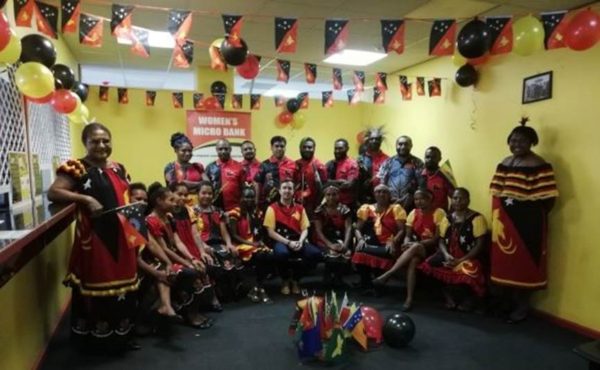
Mama-Bank Access Points in rural Papua New Guinea
The MAP initiative is a pilot from Women’s Micro-Bank Limited (WMBL) through a partnership with UNCDF’s Pacific Financial Inclusion Programme (PFIP).
Mama-Bank Access Points (MAPs) branchless banking solution
PHB is proud to be a part of a new technology-based program that is bringing financial services to women in rural areas of Papua New Guinea (PNG), even offline. The Mama-Bank Access Points (MAPs) branchless banking solution is being piloted at six locations in Papua New Guinea with the aim of providing basic financial services to PNG’s unbanked women.
Pic: The WMB team ready to propel the MAP agenda
The MAP initiative is a pilot from Women’s Micro-Bank Limited (WMBL) through a partnership with UNCDF’s Pacific Financial Inclusion Programme (PFIP). The project aims to reach out to existing and potential new women clients of WMBL in rural areas, who are currently not able to access basic financial services due to the time and costs associated with travel to distant bank offices. There are also cost and logistic challenges to the establishment of brick and mortar branches in most provinces, further complicating some situations.
PHB Development is working with WMBL and PFIP to support system development based on human-centric design (HCD), which helps ensure actual benefits for the users, and that it is accessible within their routines. Grace Akinyi is a PHB consultant on the project: “What I’ve seen is that women are still marginalized in some areas of PNG, so they try to make a living by selling wares in the streets. We want to help improve their livelihoods by extending access to financial services in their communities. It’s the first of its kind there, and it’s a solution to a real need.”
The 13-month pilot began in March 2018, and is part of the PFIP, a Pacific-wide program that helps low-income Pacific islanders obtain access to financial services and financial education, often through innovation with financial services and delivery channels. “Mama-Bank Access Points will help the women in rural and also urban areas. Some accounts they have are not active, and this will help with a more direct and interactive presence,” said Grace.
Gunanidhi Das, General Manager of WMBL, said, ”The only solution to provide banking services for unbanked rural clients and inculcate savings culture among them is to have a technology-enabled robust solution near to their locations. The MAP project, sponsored by PFIP and supported technically by PHB Development, is the way forward to accomplish this mission and bring success to women of PNG as well as to WMBL. We are very much thankful to PFIP and PHB for their support.”
And looking ahead, Grace added, “The MAPs can be taken to other provinces so that women can do more – and help themselves. People are positive about the initiative, and even excited to see it bringing the services out to those who previously had no access.”
PFIP is jointly administered by the United Nations Capital Development Fund (UNCDF) and the United Nations Development Programme (UNDP) and receives funding from Australia, New Zealand and the European Union.
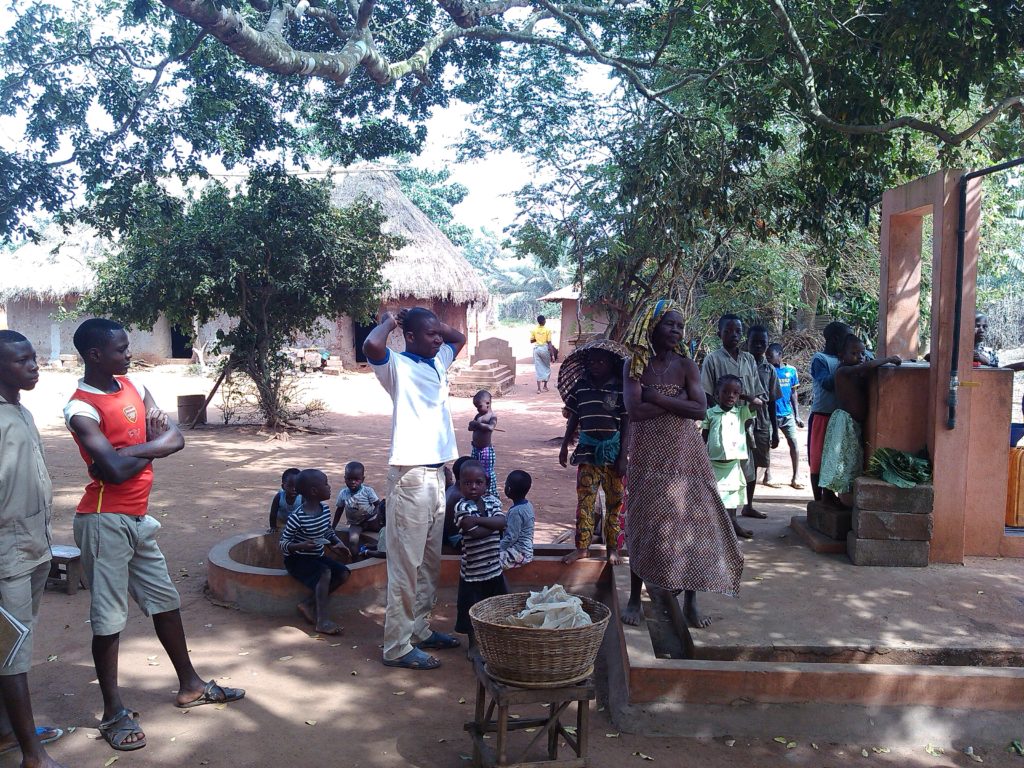
The mWater story through photos: Water accessibility with DFS+
How can digital finance assist the poor in attaining basic necessities? DFS+ is a term for digital financial services that enable the poor to have better access to basic utilities of life including health services, water and education.
How can digital finance assist the poor in attaining basic necessities? DFS+ is a term for digital financial services that enable the poor to have better access to basic utilities of life including health services, water and education. mWater is one such service that provides digital solutions to help find better access to clean water.
PHB would like to share some powerful photos of the daily struggles to access clean water in Benin. It is hoped that these photos demonstrate the need and amount of effort for the poor to access water.
mWater is a project of Manobi, Mobile for Development, that serves 150 water systems in Benin. The “Services to Improve Rural Water Service Performance in Benin” project links administrators, operators, managers, inventory agents and households to make water resources more accessible for the poor. PHB Development assisted GSMA and Manobi in various data and linkage aspects of this project.
Philippe Breul and Jean Pouit of PHB trained data collection agents in the field to gather data for a baseline survey to be supervised by GSMA. After meeting stakeholders including the World Bank, the PHB team met mobile network operators (MTN, Moov), CePEPE, and banks before field visits in the Sakété and Zogbodomey regions in December 2015. The goal was to better understand the mWater ecosystem: operators, final users, and mobile agents. After training data-collection agents for each region, a questionnaire was finalized to feed the baseline survey, and then validated by GSMA in 2016. Furthermore, PHB along with the other supporting organizations of the project helped establish links with mobile money agents for the payment of water usage.
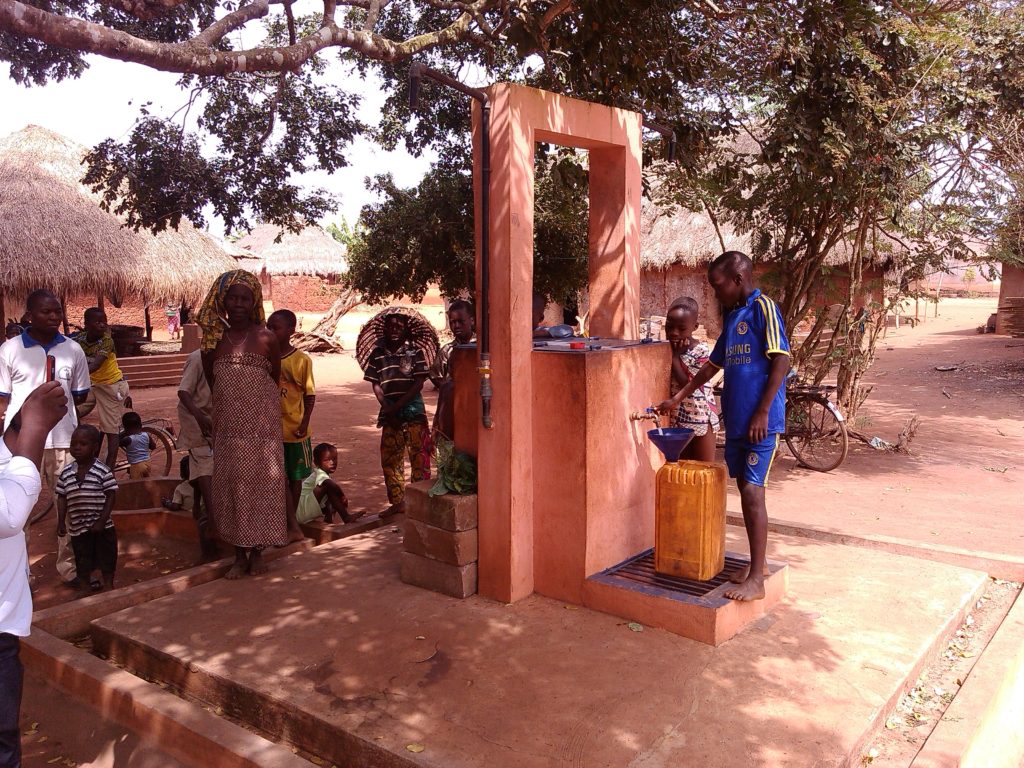
Manobi converging solutions (Mobile 2 Internet) are optimizing the performance of this industry. They are exploited in rural and urban locations in several areas:
- Participatory management of the infrastructure of access to water
- Maintenance of rural networks of water access
- Curative and preventive maintenance of water supply in an urban area
- Regulation of operations and maintenance
- Mapped inventory and inspection of water networks
For more information on the project, please contact Jean Pouit at jpouit@phbdevelpment.com.
Contribution: Jean Pouit
